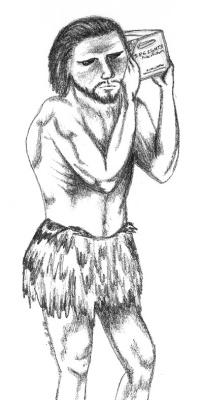Henree 
| Who was Henree Guberglebonk? : He was the last of the Neanderthals. He lived in a remote valley in Fiordland in the lower South Island of New Zealand. The valley was cut off from time and the so-called advancements of society. Though he did manage to procure some essentials from time to time from the nearby Haast Hotel. His chickens were small Moas (also presumed extinct) and the introduced Moose was his cow herd. The New Zealand Eagle he used as a watchdog and with its help he was able to hide from prying eyes. The only setback in Henree's long and happy life was that there were no females to share with him, but then maybe that's why he was so happy :) Generally Henree would not have fitted into our civilised society at all well... mind you he would have been a good bouncer at a nightclub, afterall who would have argued with someone build like a wrestler and twice as strong as any modern man. Generally though he was happier in his valley away from the speed and hassles that we put up with during our lives. If I disappear sometime you know I have found his valley and decided to go there...
Henree's People have lived in New Zealand for 1000's of years. They were a light skinned race, being adapted to the cold times of the ice age. When the first new immigrant arrived about 1000 years or so ago, his people hid from them and it is doubtful that the polynesians were even aware of their existance. Though one theory is that they interbred with the early people and produced the quite distinctive Moriori of the Chathams. When the white man arrived in the late 1700's early 1800's the true people (as they refered to themselves) had retreated to several valleys in Fiordland. Even though they had little or no contact with the Europeans, the animals they introduced soon carried diseases to them and having no resistance they were all but wiped out. Henree could speak english rather well, having taught himself by listening to the crystal set he had built around 1930. He had apparently been quite a beachcomber in those days and had once found a box of early science journals with many useful tools in it. His native language seemed to have had many Germanic and Nordic elements in it.
|
